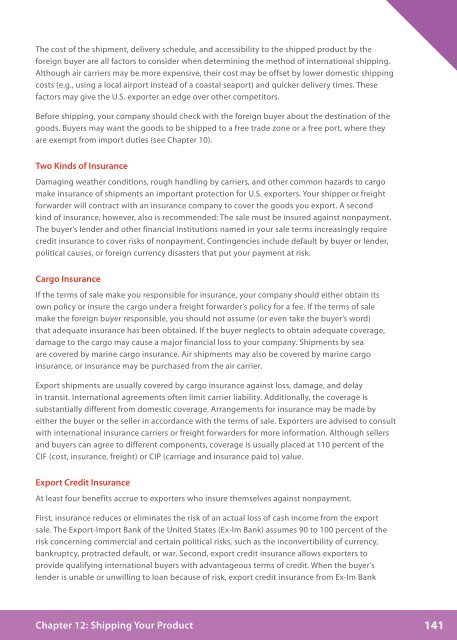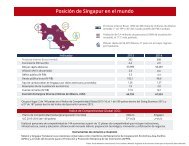basic-guide-to-exporting_Latest_eg_main_086196
basic-guide-to-exporting_Latest_eg_main_086196
basic-guide-to-exporting_Latest_eg_main_086196
Create successful ePaper yourself
Turn your PDF publications into a flip-book with our unique Google optimized e-Paper software.
The cost of the shipment, delivery schedule, and accessibility <strong>to</strong> the shipped product by theforeign buyer are all fac<strong>to</strong>rs <strong>to</strong> consider when determining the method of international shipping.Although air carriers may be more expensive, their cost may be offset by lower domestic shippingcosts (e.g., using a local airport instead of a coastal seaport) and quicker delivery times. Thesefac<strong>to</strong>rs may give the U.S. exporter an edge over other competi<strong>to</strong>rs.Before shipping, your company should check with the foreign buyer about the destination of th<strong>eg</strong>oods. Buyers may want the goods <strong>to</strong> be shipped <strong>to</strong> a free trade zone or a free port, where theyare exempt from import duties (see Chapter 10).Two Kinds of InsuranceDamaging weather conditions, rough handling by carriers, and other common hazards <strong>to</strong> cargomake insurance of shipments an important protection for U.S. exporters. Your shipper or freightforwarder will contract with an insurance company <strong>to</strong> cover the goods you export. A secondkind of insurance, however, also is recommended: The sale must be insured against nonpayment.The buyer’s lender and other financial institutions named in your sale terms increasingly requirecredit insurance <strong>to</strong> cover risks of nonpayment. Contingencies include default by buyer or lender,political causes, or foreign currency disasters that put your payment at risk.Cargo InsuranceIf the terms of sale make you responsible for insurance, your company should either obtain itsown policy or insure the cargo under a freight forwarder’s policy for a fee. If the terms of salemake the foreign buyer responsible, you should not assume (or even take the buyer’s word)that adequate insurance has been obtained. If the buyer n<strong>eg</strong>lects <strong>to</strong> obtain adequate coverage,damage <strong>to</strong> the cargo may cause a major financial loss <strong>to</strong> your company. Shipments by seaare covered by marine cargo insurance. Air shipments may also be covered by marine cargoinsurance, or insurance may be purchased from the air carrier.Export shipments are usually covered by cargo insurance against loss, damage, and delayin transit. International agreements often limit carrier liability. Additionally, the coverage issubstantially different from domestic coverage. Arrangements for insurance may be made byeither the buyer or the seller in accordance with the terms of sale. Exporters are advised <strong>to</strong> consultwith international insurance carriers or freight forwarders for more information. Although sellersand buyers can agree <strong>to</strong> different components, coverage is usually placed at 110 percent of theCIF (cost, insurance, freight) or CIP (carriage and insurance paid <strong>to</strong>) value.Export Credit InsuranceAt least four benefits accrue <strong>to</strong> exporters who insure themselves against nonpayment.First, insurance reduces or eliminates the risk of an actual loss of cash income from the exportsale. The Export-Import Bank of the United States (Ex-Im Bank) assumes 90 <strong>to</strong> 100 percent of therisk concerning commercial and certain political risks, such as the inconvertibility of currency,bankruptcy, protracted default, or war. Second, export credit insurance allows exporters <strong>to</strong>provide qualifying international buyers with advantageous terms of credit. When the buyer’slender is unable or unwilling <strong>to</strong> loan because of risk, export credit insurance from Ex-Im BankChapter 12: Shipping Your Product141





